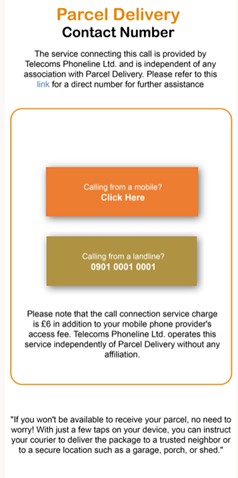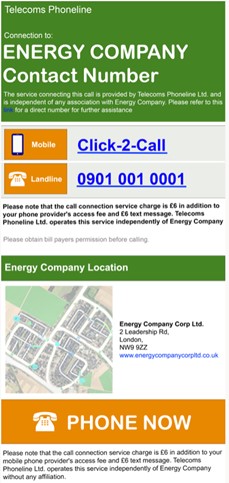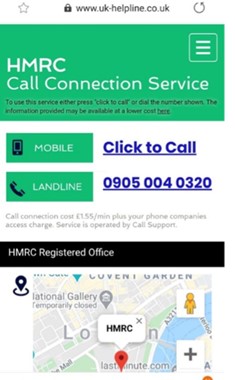ICSS Compliance update
The PSA has serious concerns regarding the promotion and operation of ICSS.
The findings of the thematic review and recently completed enforcement work have brought to our attention multiple issues concerning the transparency of information that is needed to enable consumers to make informed decisions and the fair and equitable treatment of consumers.
While we are consulting on proposed changes to our Code of Practice which aim to improve consumer understanding of ICSS and reduce associated detriment, we remind providers of what is currently required.
This compliance update covers three areas where we have particular concerns:
- transparency of key information (including pricing prominence)
- fairness, and
- ICSS SMS receipts.
1. Transparency
ICSS providers must:
- Ensure the cost of using the service is made abundantly clear. Transparency Requirement 3.2.1 requires the cost to be displayed prominently within the promotion. Pricing must be clear, legible, visible, and proximate to the premium rate number and/or click-to-call button. We have seen many instances where the cost is not prominent on a webpage, particularly in comparison to click-to-call buttons. We have created these examples which we have constructed from features of real pages and which we consider to be non-compliant:
In the recent case against Heidi Corkhill trading as Call Support, the provider failed to make the obligation to pay clear on click-to-call buttons - the consumer was simply invited to activate the click-to-call button. Pricing information was insufficiently clear, being displayed in a much smaller font size and less vibrant colours when compared to the call-to-action buttons. Key information was presented beneath the call-to-action rather than immediately before or above it, making it insufficiently proximate as it required close examination. This is demonstrated below.
We urge providers to read the Transparency Standard guidance which sets out very clearly what is meant by prominent, clear, legible, visible and proximate and provides example pricing information wording.
- Ensure consumers are fully and clearly informed of all information that is likely to influence their decision to use the service before they incur any charges. Transparency Requirement 3.2.2 sets out what information promotional material must include. Promotions for ICSS must include the following:
- a clear description of what the service is and/or does. It is essential that an accurate description of the true nature of the service is made abundantly clear given the lack of consumer awareness and understanding of ICSS. It is not acceptable to use terms such as “customer service” or “helpline” within promotions, including search engine marketing or URLs to describe the ICSS. Such terms do not accurately reflect the true nature of the service and could mislead consumers into believing they are contacting the organisation they are seeking directly - therefore also falling foul of Fairness Requirements 3.3.2 and 3.3.3.
- the cost of using the service per minute or per call, including information on phone company access charges and any other additional chargeable elements such as follow-up SMS.
- explaining that the company to which the service connects can be contacted directly for no or lower cost (where this is factually the case) and providing a link to the homepage of the company it connects to, to assist consumers in contacting them directly.
- advise consumers that calls to the service will be terminated once £40 service charge is reached where such a cap is in place.
- Only provide correct information about the opening times of the organisations they connect to.
- the provider’s name and the name of the service as registered with us.
- contact details for customer care and complaints.
- Use of service - all ICSS must have an alert upon connection to the service that states clearly the cost of continuing the call, including the cost of any chargeable SMS and information about phone company access charges. This information must be provided before onward connection, this is Transparency Requirement 3.2.10.
ICSS providers should:
- Ensure that the cost of calling stands out on the landing page and is presented in a way that cannot be missed. This means that the cost should be equally prominent, or more prominent than any ‘click to call’ button or other calls to action. We recommend displaying the cost immediately above the call to action. If the call to action is repeated the cost should also be repeated in a prominent, clearly legible, visible, and proximate manner.
- Clearly explain within any promotion that the service is not associated in any way with the organisation it connects to.
- Clearly explain within any promotion that the organisation which the ICSS connects to can be contacted directly for no or lower cost and provide a link to that organisations homepage to assist consumers in contacting them directly.
- Not provide connection to organisations that have call wait times that are longer than the duration dictated by a £40 service charge cap otherwise consumers will be charged for not receiving any service at all.
- Ensure consumers cannot connect to the ICSS at all if the sought-after organisation is closed to prevent the consumer from incurring a charge for not receiving any service at all.
- State within the alert upon connection that the consumer is not contacting the organisation they are seeking directly and confirm who the ICSS is provided by as well as confirming the name of the organisation the consumer will be connected to.
ICSS providers must:
- Not mislead consumers. ICSS providers must not use any marketing techniques, language, or imagery which is misleading or has the potential to mislead consumers into believing the ICSS is associated with or provided by the organisation they are seeking. Misleading imagery and language includes but is not limited to:
- logos that belong to other organisations, or using colour and typeface that is the same or similar to other organisations.
- terms such as “helpline”, “customer service” and “contact number”.
- including the name of sought after organisations or other misleading language within domain names.
- the use of addresses and maps purportedly showing the location of the sought-after organisation.
- any other general information about the sought-after organisation which is often information lifted straight from that organisation’s website.
The example below would not be considered compliant because of the use of misleading language and imagery – the use of the map. We have created this example of a non-compliant landing page for an ICSS connecting to HMRC. This example would not comply with Transparency Requirements as we have explained earlier in this notice. The presence of “tax credits helpline” and the map means it would not comply with the Fairness standard either.
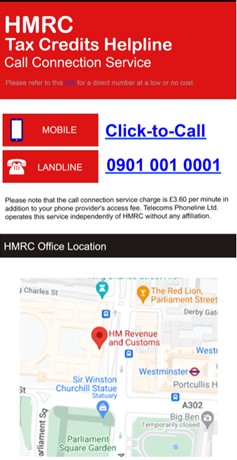 |
||||
In the adjudication against Heidi Corkhill trading as Call Support, the Tribunal upheld a misleading breach for this type of practice - i.e. the inclusion of a map. The Tribunal considered there to be no other purpose for the inclusion of maps within the promotion other than to mislead consumers into thinking the service was the sought-after organisation. In this case, the provider also presented opening time information of an organisation they connected to which was incorrect.
Similarly in the adjudication against Connect You Limited, the Tribunal also upheld a misleading breach for this type of practice. In this case, the Tribunal considered that the use of the sought after organisation’s information within the promotional material was not only misleading but designed to mislead consumers. They went on to say that the language used, the tone, and information all suggested that the ICSS was the sought after organisation and not a call connection service.
We provide below non-compliant examples from the recent adjudications:
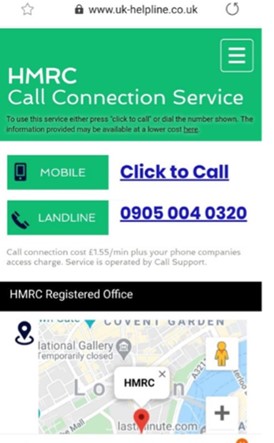 |
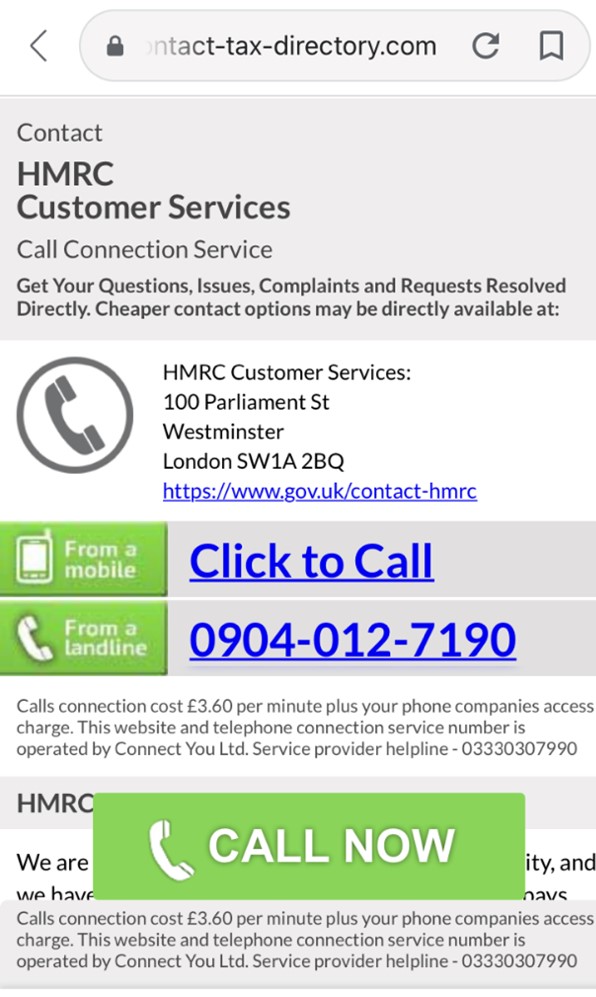 |
|||||||||
3. ICSS that provide SMS as part of the service
ICSS providers must:
- Provide receipts for SMS charges Some ICSS now provide SMS(s) on completion of a call that contain details of the organisations they connect to. The Code Requires receipts to be provided to mobile network consumers for all transactions besides voice calls (Requirement 3.2.12). Where an ICSS provides a chargeable follow-up SMS providers must ensure that receipts are being provided to consumers. Receipts for ICSS chargeable SMS must set out:
- the name of the service as registered with the PSA.
- the name and contact details of the intermediary provider or merchant provider responsible for customer care and complaints.
- details of the amount that has been charged – we recommend that receipts include the cost of the voice call as well as the SMS charge where it is possible to do so to avoid potential consumer confusion.
It is possible for an ICSS chargeable SMS to also act as the receipt where it is possible to include the necessary information listed above.
- Avoid sending more than one chargeable follow-up SMS where there is no added value or justification for doing so. For example, we have seen some merchants sending two chargeable SMS where the content is duplicative or only very slightly different. This practice does not constitute fair and equitable treatment as the second SMS is not providing any additional benefit to consumers - the consumer is being charged twice to receive repeated information. The example we have created below would not be considered compliant:
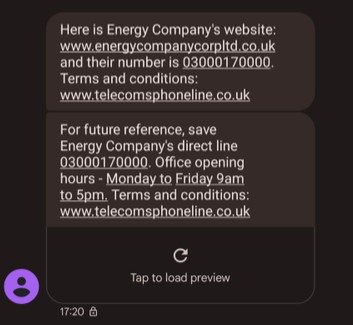 |
||
We recommend that ICSS providers who choose to send a follow-up SMS containing details of the organisations they connect to, do so free of charge to further reduce financial detriment and provide genuine benefit to consumers.
Further recommendations
ICSS providers should:
- Read and understand this compliance update and the recent ICSS adjudications against Heidi Corkhill t/a Call Support, and Connect You Limited.
- Follow the examples set out in Transparency and Fairness guidance.
- Familiarise themselves with the Vulnerable consumers Standard and supporting guidance and carefully consider the types of organisations they connect to, to avoid causing detriment to consumers who may be considered vulnerable.
- We strongly recommend providers follow search engine advertising policies and do not take steps to circumvent them.
- Finally, we would remind providers that free of charge compliance advice is available upon request by emailing compliance@psauthority.org.uk.

